

Cosa fai a fine anno? by Associazione InformaGiovani. Youthpass - What is non formal learning? During all your live you learn in formal (like school, university), non-formal (courses, sports club) and informal (from parents and friends) settings.
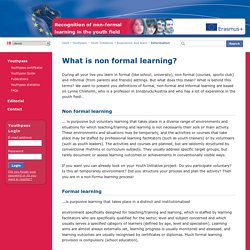
But what does this mean? What is behind this terms? We want to present you definitions of formal, non-formal and informal learning are based on Lynne Chisholm, who is a professor in Innsbruck/Austria and who has a lot of expereince in the youth field:. Non formal learning ... is purposive but voluntary learning that takes place in a diverse range of environments and situations for which teaching/training and learning is not necessarily their sole or main activity.
If you want you can already look on your Youth Initiative project: Do you participate voluntary? Entrepreneurial education – Non-formal training in Bulgaria. On 3 March 2010 The European Commission presented Europe 2020 Strategy for smart, sustainable and inclusive growth (COM (2010) 2020), whose key initiative “Youth on the move” is aimed at improving the performance of education systems and facilitating the entry of young people into the labor market.

Two key priorities for future policy and action of the Bulgarian Youth strategy 2010-2020 emerged: promoting entrepreneurship and innovation with regards to young people. Despite the successful models and best practices in project “JOBS – Job Opportunities through Business Support”, project “Promotion of innovation activity among young people in Bulgaria – Technostart” and project “Creating Competitive Start-ups -Project 100″, the access to information, advisory services and financing for setting-up , education and development of entrepreneurial initiatives of young people is still limited.
Some young bulgarian entrepreneurs. Source: blog.up.co Preparing ICT students to start a business. 144656e. Richard Branson: Why entrepreneurs struggle with formal education. When I was a young student, my restlessness and curiosity prompted me to set up Student magazine when I was just 15.

Running the magazine actually served as an entrepreneurial education - I learned to effectively build a team, sell advertising, create content and market a product. I was my own boss and never needed to ask permission to try new things, and if I got things wrong, I did not have to fear the wrath of a superior. After all, a willingness to try new things and fail is important to becoming an entrepreneur, yet making mistakes flies against the expectations of traditional schooling. So in many ways, my education has been my career. For almost 50 years, Virgin’s varied collection of businesses and non-profits means that I have studied and come to understand many sectors - aviation, banking, media, hospitality and the fitness industry, to name a few.
144935e.pdf. EUCIS-LLL-position_Fostering-entrepreneurial-mindsets.pdf. Promozione cooperativa nella scuola by marilena raule on Prezi. Wcms_094018.pdf. Report-creative-potential_en. 010_SALTO_Participation.web_A work in progress[2] Nonformal Teaching Methods, 4H-018-99. 2120 Fyffe Rd., Columbus, OH 43210-1084 Larry L.
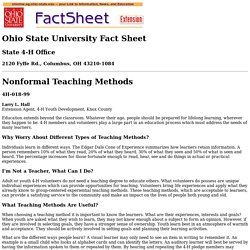
Hall Extension Agent, 4-H Youth Development, Knox County Education extends beyond the classroom. Whatever their age, people should be prepared for lifelong learning, wherever they happen to be. 4-H members and volunteers play a large part in an education process which must address the needs of many learners. Why Worry About Different Types of Teaching Methods? Individuals learn in different ways. I'm Not a Teacher, What Can I Do? Adult or youth 4-H volunteers do not need a teaching degree to educate others. What Teaching Methods Are Useful? When choosing a teaching method it is important to know the learners. What are the different ways people learn? Involving youth in different activities while they learn new material strengthens knowledge retention. Lecture This method is probably the most common form of education. Demonstration A skilled educator may wish to both tell and show what steps to take in an educational process.
Discussion References. Jamia - Departments -Department of Teacher Training & Non-formal Education - Introduction. Introduction The Department of Teacher Training & Non-Formal Education was established as a Teacher Training Institute in 1938 under the inspiring leadership of Dr.
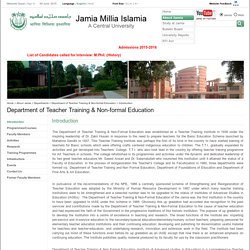
Zakir Husain in response to the need to prepare teachers for the Basic Education Scheme launched by Mahatma Gandhi in 1937. This Teacher Training Institute was perhaps the first of its kind in the country to have started training of teachers for Basic schools which were offering crafts centered indigenous education to children. The T.T.I. gradually expanded its activities and got developed into Teachers’ College. T.T.I. who also took lead in the country by offering teacher training programme for Art Teachers in schools.
Department of Teacher Training & Non Formal Education (Institute of Advanced studies in Education) is a comprehensive Teacher Education Institution which offers following courses: BUL17.pdf. GP_Tools-For-Learning-in-non-formal-educ_GB_130912_HD. Nonformal_ed_manual1. Team-buildinggamesactivitiesideas.pdf. 8 Fun and Effective Team Building Activities. Team Building games are activities with an intentionally aim to develop relationships, improve the dynamics and help strengthen the sense of identity of those within your group.
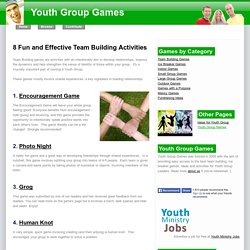
It's a crucially important part of running a Youth Group. These games mostly involve shared experiences, a key ingredient in building relationships. 1. Encouragement Game The Encouragement Game will leave your whole group feeling good! 2. A really fun game and a great way of developing friendships through shared experiences. 3. This game was submitted by one of our readers and has received great feedback from our readers. 4. A very simple, quick game involving creating (and then untying) a human knot. Team Building Activities and Games for Youth Groups.
GP_Tools-For-Learning-in-non-formal-educ_GB_130912_HD. Informal and non-formal learning. Council_Recommendation_on_the_validation_20_December_2012.pdf. Recognitiondraftsynthesis[1] FRAE Baeklingur anskiptinga 849046889[1] Kompetenzf finalpublication[1] 4117_en. 4117 en[1] Glossary. A glossary of key terms used in the validation of non-formal and informal learning.
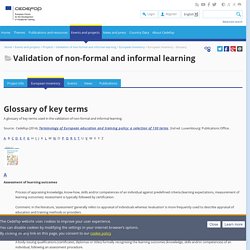
Source: Cedefop (2014). 4272-ico1-1-Non-formal-learning-activities.jpg (JPEG Image, 848 × 449 pixels) Ttp_samoore.gif (GIF Image, 590 × 383 pixels) Formal_informal_learning.jpg (JPEG Image, 350 × 349 pixels) 1.jpg (JPEG Image, 569 × 222 pixels) You can’t manage informal learning – only the use of informal media. Recently I’ve been reading more and more blog posts and articles that talk of how to “manage informal learning”, so I thought it was time for another post of my own that tries to explain how this is actually misleading, and in fact misses the big picture in terms of the importance of informal learning in the workplace, and L&D’s role in supporting it.
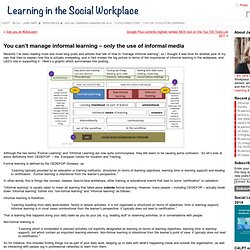
Here’s a graphic which summarises this posting. Although the two terms “Formal Learning” and “Informal Learning are now quite commonplace, they still seem to be causing some confusion. So let’s look at some definitions from CEDEFOP – the European Centre for Vocation and Training. Formal learning is defined by the CEDEFOP Glossary as.